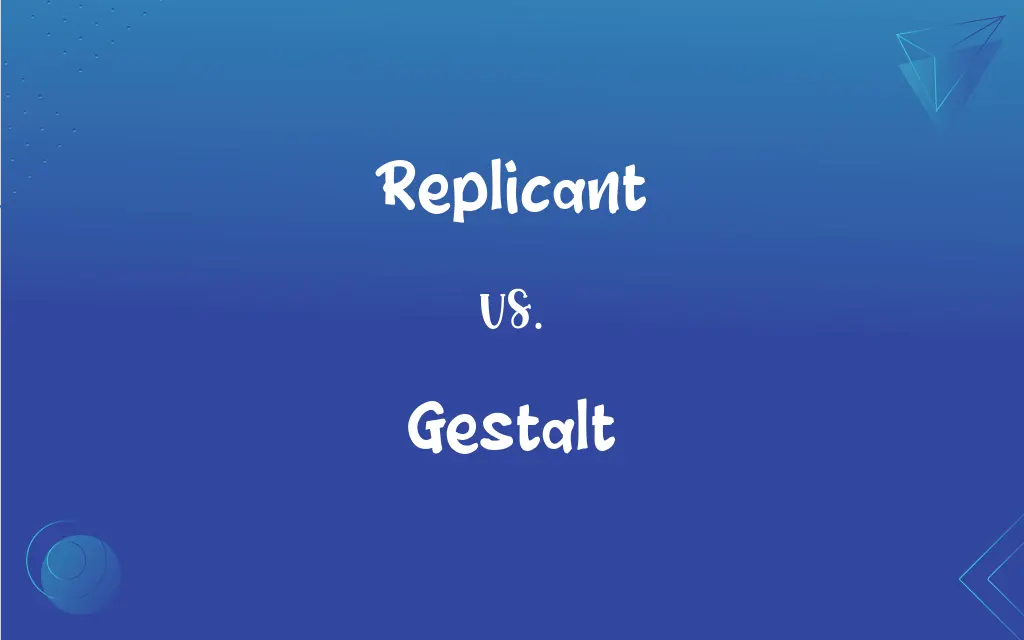Replicant vs. Gestalt: What's the Difference?
Edited by Janet White || By Harlon Moss || Updated on November 8, 2023
A replicant is a fictional bioengineered being, while a gestalt refers to a whole that is perceived as more than the sum of its parts.

Key Differences
Replicant and gestalt are terms from different domains. A replicant, in science fiction, is a bioengineered or artificial being that closely resembles a human. It is a term popularized by the "Blade Runner" franchise, implying a copy or duplication of humans. Gestalt, from psychology, describes an organized whole that is perceived as more than the sum of its parts. This could be a pattern, structure, or configuration, which is recognized on an intuitive level by the human mind.
The concept of a replicant centers around replication and imitation, often of human appearance and behavior, to the point where it can be difficult to distinguish them from real humans. Gestalt, however, deals with perception and how the human mind intuitively recognizes patterns and structures as complete forms, rather than just a collection of individual components.
Replicants are a product of fictional narratives, typically used to explore themes of identity, humanity, and ethics in artificial intelligence. Gestalt is a term grounded in psychology and philosophy, used to explain human perception, especially visual experiences and problem-solving. It suggests that our perceptions are contextually based on wholes, not just on parts or a summation of parts.
In terms of their application, replicants are used within narratives to question the nature of humanity and the possibility of artificial life forms possessing human traits such as emotion and self-awareness. Gestalt principles are applied in various fields such as design, art, and therapy to understand how people organize and interpret sensory information to make sense of the world around them.
When considering the utility of both terms, replicants are a fictional construct used primarily in storytelling and speculative thought experiments. In contrast, gestalt principles have practical applications in understanding real-world phenomena, including cognitive processes and aesthetic appreciation.
ADVERTISEMENT
Comparison Chart
Definition
A bioengineered entity
A whole perceived as greater than its parts
Origin
Science fiction
Psychology
Focus
Mimicking human form and behavior
Perception and pattern recognition
Usage
Fictional narratives
Real-world applications
Purpose
Explore themes of humanity
Understand cognitive experiences
ADVERTISEMENT
Replicant and Gestalt Definitions
Replicant
Bioengineered humanoid.
The replicant passed as human in the crowded city.
Gestalt
Whole greater than parts.
The gestalt of the picture was more haunting than its details.
Replicant
Fictional artificial being.
In the novel, replicants had their own society.
Gestalt
Pattern recognition.
He studied the gestalt of urban planning.
Replicant
Human mimic.
Replicants in the film had emotions like any person.
Gestalt
Organizational principle.
The gestalt of the symphony created an emotional response.
Replicant
Synthetic organism.
She designed a replicant with advanced AI.
Gestalt
Perception philosophy.
Her design followed gestalt principles for maximum impact.
Replicant
Blade Runner entity.
He couldn't tell if his friend was a replicant.
Gestalt
Psychology theory.
The therapist used gestalt therapy to treat his patient.
Replicant
Replicative
Gestalt
A physical, biological, psychological, or symbolic configuration or pattern of elements so unified as a whole that its properties cannot be derived from a simple summation of its parts.
Replicant
(science fiction) A robot or artificial being that is an exact copy of a genuine lifeform, especially a human.
Gestalt
A collection of physical, biological, psychological or symbolic elements that creates a whole, unified concept or pattern which is other than the sum of its parts, due to the relationships between the parts (of a character, personality, entity, or being)
This biography is the first one to consider fully the writer's gestalt.
Replicant
(archaic) One who replies.
Gestalt
Shape, form
Replicant
One who replies.
Gestalt
A configuration or pattern of elements so unified as a whole that it cannot be described merely as a sum of its parts
FAQs
Can replicants think?
In fiction, they are often portrayed as having human-like cognition.
What does gestalt mean?
A concept where parts are perceived as a unified whole.
What is a replicant?
A bioengineered being designed to resemble a human.
Who developed gestalt theory?
It was developed by German psychologists in the early 20th century.
Do replicants age?
In stories, they may or may not age, depending on the narrative.
Who created replicants?
They are a creation of science fiction writers.
Are replicants real?
No, they are fictional constructs from science fiction.
Is gestalt only a psychological term?
While rooted in psychology, it's used in design and art too.
Can gestalt be applied to technology?
Yes, in user interface design and other areas.
Are all artificial humans replicants?
No, the term is specific to certain sci-fi narratives.
Could replicants have rights?
This is a topic of debate in science fiction.
Do gestalt principles work with all senses?
They are mostly visual but can apply to other senses.
How does gestalt affect art?
It influences how viewers perceive and interpret artworks.
Does gestalt involve emotions?
It's more about perception than emotions.
Is gestalt therapy effective?
It can be, depending on the individual and the therapist.
Do replicants have emotions in fiction?
Often they do, as a way to explore what makes us human.
Is gestalt a holistic approach?
Yes, it looks at entire structures rather than just parts.
Can gestalt principles be taught?
Yes, especially in design and psychology education.
Is the term replicant copyrighted?
It may be associated with specific franchises.
Are replicants robots?
They're often more advanced, resembling biological entities.
About Author
Written by
Harlon MossHarlon is a seasoned quality moderator and accomplished content writer for Difference Wiki. An alumnus of the prestigious University of California, he earned his degree in Computer Science. Leveraging his academic background, Harlon brings a meticulous and informed perspective to his work, ensuring content accuracy and excellence.
Edited by
Janet WhiteJanet White has been an esteemed writer and blogger for Difference Wiki. Holding a Master's degree in Science and Medical Journalism from the prestigious Boston University, she has consistently demonstrated her expertise and passion for her field. When she's not immersed in her work, Janet relishes her time exercising, delving into a good book, and cherishing moments with friends and family.
































































